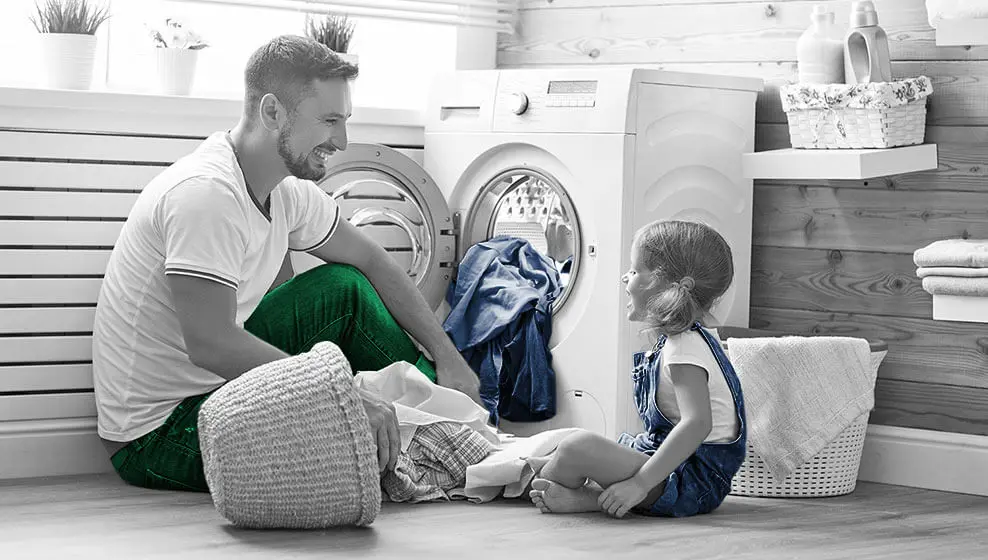Washing machines are a lifesaver for busy Australians, but they can also be a major energy burn.
Some statistics estimate that the washing machine is responsible for 7% of your energy bill.
It's easier than you think to figure out how much your washing machine is costing you per load, as long as your washer was manufactured in 1992 or later.
It is mandatory for washing machines to display an energy efficiency label, which tells you how many kilowatt hours (kWh) it uses, on average, each year.
This figure is based on 7 warm washes per week, so you may need to adjust based on your personal use.
Simply multiply the kilowatt hours by your energy rates (cents per kWh) and you'll have a good idea of how much you’re spending each year on washing.
Depending on how often you use your washing machine, this figure may be higher than you'd hoped!
Fortunately there are plenty of things you can do to save energy when you're washing clothes.
Put these tips into effect and watch your energy bill drop.
COMPARE & SAVE9 tips for saving energy on your washing machine
1. Wash your clothes in cool water as often as possible.
According to the Energy and Water Ombudsman NSW, switching from hot or warm washes to cold could save you up to $124 each year.
Many people believe that we need to wash clothes in warm water, but the truth is cold water can keep colours bright and cut down on wrinkles.
What's more, warm water can actually set stains, especially protein-based ones.
Try laundry detergent designed specifically for cold-water washing for best results.
2. Pre-soak stains.
While we're talking about stains, don't rely on your washing machine to take care of them for you.
That can often lead to washing things more than once to eliminate a stain, which uses twice the energy.
Soak your stains in cold water for at least half an hour before washing, and use stain remover if applicable.
3. Wait for a full load.
We're all guilty of running a load with only a handful of things in the washing machine, but this is a habit that could cost you.
A smaller load may use less water, but it will use the same amount of energy: washing machines use the same amount of mechanical energy, no matter how big the load.
4. Run your machine on the shortest cycle
If your machine has a setting that says 'fast wash' or 'eco cycle,' use it!
These washes are designed for energy efficiency, not just cycle speed.
Run the shortest cycle whenever you can; the savings will add up.
5. Reduce your weekly loads.
Keep track of how many loads you're washing each week.
Are all of them necessary, or can you condense into fewer loads?
Not only will this save your energy costs, it'll save your physical energy by cutting down on the number of times you do laundry!
6. Switch off the power at the wall.
This tip is a great money-saver for all of your appliances, not just the washing machine.
When the machine is plugged in but not in use, it continues to suck power.
Flip the switch at the wall to cut off power to appliances you're not currently using, and it could save you 10% on your energy bill!
7. Wash your clothes during controlled load times.
Many energy retailers charge different rates for peak and controlled load usage.
If yours does, try to do your laundry during off-peak times because it could save you.
8. With solar power, run your washing machine during the day.
Solar power savings are biggest when you're using the energy as it’s being absorbed from the sun, which is during daylight hours.
If you run your washing machine when the sun shines, you can cut down on the energy you're pulling off the grid.
You can get further savings with solar by using a machine with a hot water connection, which means that it draws water already heated by your solar system, rather than heating it within the machine.
9. Choose an energy efficient washing machine.
When you’re in the market for a new washing machine, pay attention to the energy efficiency ratings.
The NSW Office of Environment and Heritage suggests buying a washing machine with at least a 3.5 star rating.
Each additional energy star represents a savings of 27% on the lifetime running cost of your washing machine.
In general, front load washing machines tend to be more energy efficient, though it can be difficult to find front loaders with a hot and cold water connection.
Also, look for a machine that automatically senses the weight of the load and adjusts the water level accordingly.
COMPARE & SAVEThis guide is opinion only and should not be taken as financial advice. Check with a financial professional before making any decisions.



